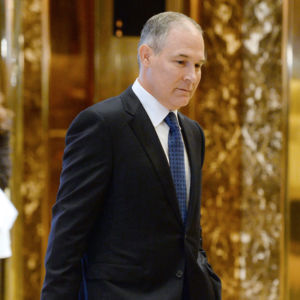On January 18, the National Oceanic and Atmospheric Administration, or NOAA, announced that 2016 marked the warmest year on record, making it the third consecutive year with such a distinction. In fact, since 2000, this record has been broken five times. These climate anomalies and the long-term trend of rising temperatures are the hallmark of manmade climate change.
The same day as NOAA’s announcement, and just two miles away from NOAA headquarters, a Senate committee was holding a confirmation hearing for Oklahoma Attorney General Scott Pruitt, President Trump’s nominee to lead the Environmental Protection Agency. Unfortunately, Pruitt’s track record in Oklahoma and his testimony during his hearing demonstrate that he has no intention of wielding this authority to take any serious action to address climate change.
In fact, Pruitt does not appear to consider climate change a significant threat. He made no mention of climate change in his written testimony, a clear reflection of where he ranks climate change on his hierarchy of priorities. And while Pruitt acknowledged during his oral testimony that “science tells us the climate is changing,” he also added that the debate over “what to do about” the world’s changing climate remains unresolved.
This debate is not unresolved. The Intergovernmental Panel on Climate Change — the world’s preeminent body charged with studying climate change — has concluded with “high confidence” that delaying efforts to reduce greenhouse gas emissions such as carbon emissions will make it ever more difficult to limit planetary warming below 2 degrees Celsius. Above that threshold, scientists warn that the world could experience potentially catastrophic effects, including more frequent and extreme weather events, heat waves, droughts, and sea level rise.
Importantly, the EPA administrator holds authority under the Clean Air Act to address climate change by requiring power plants, oil and gas operations, cars and trucks, and other greenhouse gas-emitting sources to reduce their emissions. Yet in an exchange with Sen. Bernie Sanders during Pruitt’s hearing, Pruitt begrudgingly acknowledged that the EPA has a role in regulating carbon pollution but did not commit to making carbon pollution reduction a goal of his tenure.
Pruitt has made his career out of suing the EPA and challenging its authority under the Clean Air Act. As attorney general, Pruitt joined electric utilities and coal companies to sue the EPA to block the Clean Power Plan, which set the first-ever standards for carbon pollution for power plants. He sued the EPA to block its “good neighbor” rule, which reduces pollution in upwind states that causes air quality problems in downwind states. He sued to fight the first-ever federal standards for methane pollution from oil and gas operations. He even sued when EPA set limits on mercury pollution from power plants. Mercury can cause brain damage in children exposed to it while in utero.
All told, Pruitt has sued the agency 14 times in an effort to prevent EPA from implementing limits on air pollution and water pollution from the country’s largest corporations.
A casual observer may wonder why a public servant would be so bent on challenging the nation’s most important environmental watchdog. The answer lies in Pruitt’s worldview, which aligns in lock-step with the oil and gas industry and other fossil fuel interests. He has raised $350,000 in campaign contributions from these companies and helped raise millions more to challenge EPA pollution limits in partnership with other Republican attorneys general.
Before the confirmation hearing, six Democratic members of the committee sent a letter to Pruitt, asking him to disclose certain contributions from donors in the energy industry. In the letter, the senators raised concerns about his “ability to lead EPA in a manner that is not beholden to special or secret interests.” As of the confirmation hearing, Pruitt had not yet responded to this letter.
For their part, the special interests certainly want to see Pruitt confirmed. After he was nominated, energy company executives formed an organization to collect millions of dollars in undisclosed contributions to support his confirmation.
NOAA’s latest report shows that we must act now to address the serious threat of climate change. At the same time, Americans want a strong environmental regulator at the federal level to hold special interests in check and to protect the air we breathe and the water we drink. Considering Pruitt’s close ties to the fossil fuel industry and his extensive history of litigating against his potential employer, the Senate must not confirm him to lead the EPA.

